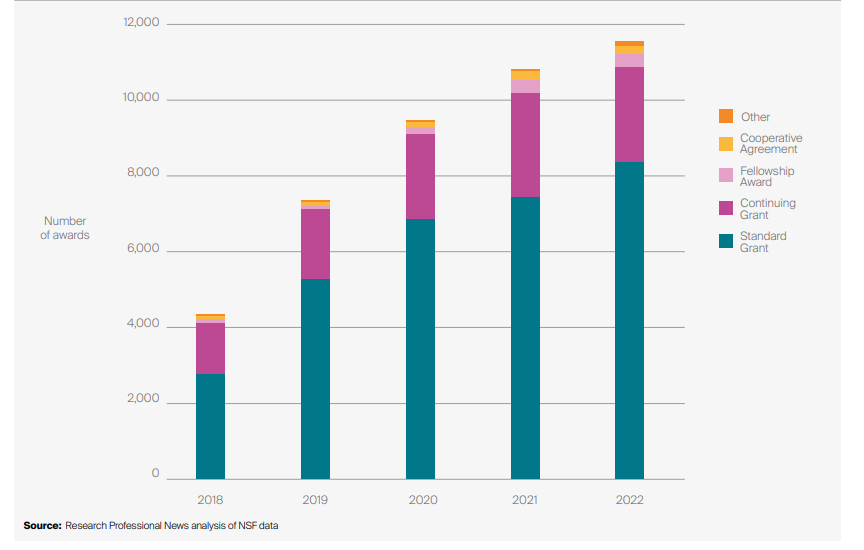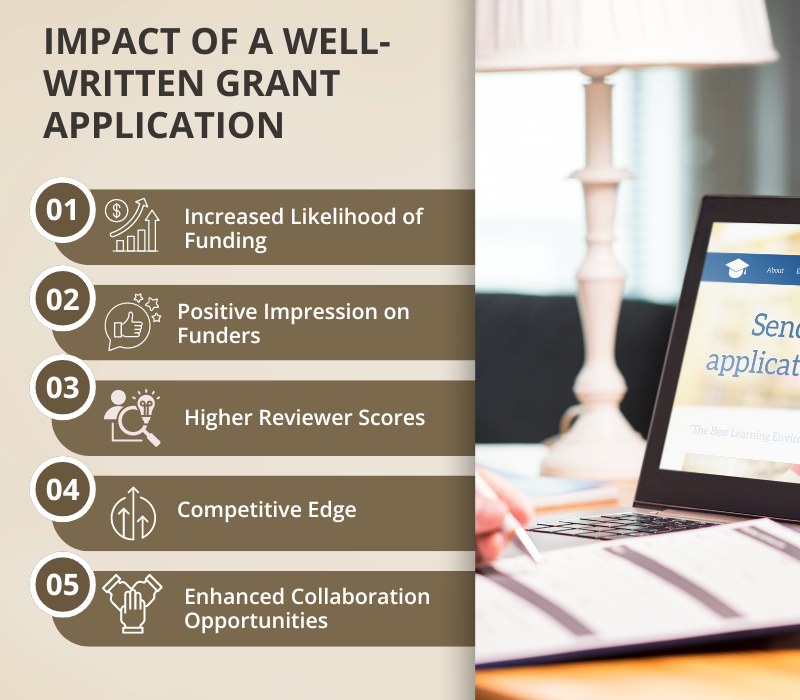Mastering Research Grant Writing in 2024: Navigating new policies and funder demands

Entering the world of grants and government funding can leave you confused; especially when trying to identify the right program for you or your organization. Furthermore, there is a significant shift in the research funding landscape in 2024. This is attributed to evolution in the policies, AI technologies, and increased competition to secure grants.
A report published by Clarivate in 2023 on ‘Research Offices of the Future’ revealed the increasing pressure among research offices to obtain funding. Additionally, the report suggested AI’s potential in compilation of information for grant applications, analysis of unsuccessful grant bids, writing grant applications, and meeting research security requirements set by funders.
Potential of AI in Grant Application
Currently, the role of AI in grant applications is substantial. However, its potential in revolutionizing researchers’ and institutions’ approach towards grant writing and submission process cannot be ignored. Here are some ways how AI can impact the grant application process:
1. Enhance Proposal Writing
AI-powered tools like TRINKA can assist in drafting and refining grant proposals by providing language suggestions, ensuring clarity, and checking for consistency. These tools can also help in identifying and correcting grammatical errors, improving the overall quality of the application.
2. Identify Suitable Grants
AI algorithms can analyze a researcher’s profile, past work, and current project details to match them with the most appropriate funding opportunities. This targeted approach can improve the chances of finding the right grant programs and reduce the time spent searching for potential funding sources.
3. Provide Data-driven Insights
By analyzing data from previous grant submissions, AI can share strategies on how to present a grant application. It can also suggest relevant literature, methodologies, and potential collaborators aligning with the funder’s priorities.
4. Review and Feedback
AI can analyze the relevance, feasibility, and impact of a research, helping the funding agencies in the evaluation process. For researchers, AI tools can provide a preliminary feedback on their proposals. Furthermore, it can identify the areas for improvement before submitting applications.
While AI promises to have a tremendous impact on the grant application process, it is imperative to address the legal, regulatory, and ethical concerns associated with it. Furthermore, the quality of AI-generated recommendations depends on the quality of the training and input data. This necessitates the need of proper measures for data privacy protection, avoiding misinformation, and inaccurate interpretation of the current funding and grant-making polices.
Trends in Grant Funding
The global trends in grant funding is marked by notable policy changes across major regions. The Funding Trends report by Clarivate suggests a steady increase in the number of grants awarded by the National Science Foundation (NSF) over the past five years.

Source: Clarivate Funding Trends Report – May 2023
However, this has led to increased competition for research funding, with success rates for grant applications often falling between 10-20%. However, to aid researchers in developing grant applications, Clarivate introduced the Web of Science™ Grants Index in 2024. By integrating awarded grant data from over 400 global funders, the tool helps researchers to make informed decisions by exploring previously funded projects.
Similarly, in Japan, Kakenhi Grants-in-Aid for Scientific Research continue to be a significant source of funding, supporting a wide range of research projects. Additionally, these grants provide financial support for creative and pioneering research projects that will become the foundation of social development. The research output obtained from the studies under these grants are widely published in academic journals. Furthermore, the Grant-in-Aid for Scientific Research (KAKENHI) Database consists of “KAKEN – Search Research Projects.” This facilitates users to search for research projects conducted by the Grants-in-Aid for Scientific Research. As a result, it streamlines the grant search process and increases the chances of securing funding support.
The recent trends in grant procurement highlight both ongoing challenges and new opportunities. These trends include:
1. Emphasis on Societal Issues
There is an increasing focus on grants addressing climate change, public health, and social inequality, with a notable rise in funding for renewable energy research, community health initiatives, and diversity and inclusion programs.
2. Collaborative Grant Programs
Growing popularity of grants encouraging partnerships between multiple stakeholders, emphasizing interdisciplinary approaches and cross-sector collaboration.
3. Sustainability
Rising interest in projects that deliver immediate results and have long-term positive impacts on communities, ecosystems, and economies.
4. Advances in Technology
Use of data analytics and AI by funding agencies to better assess the impact and feasibility of proposals, leading to more informed decision-making.
5. Intense Competition
Increased competition for limited funding, with donors prioritizing innovative, impactful, and well-written projects that address significant issues.
In response to these trends, there is a growing emphasis on capacity building and support services to help applicants improve their grant-writing skills and develop robust proposals. A data published by NIH reported a success rate of approximately 20% in 2022 for research grant application. Therefore it is essential to understand the criteria for funding decisions. Although different funding bodies have varying requirements, here are some general criteria followed by the funders for fund allocation and decision making.

Different funding agencies tailor these criteria to their specific missions and strategic goals. This ensures that the most promising and relevant projects receive support. Therefore, understanding the funder requirements can increase the chances of funding.
Writing Effective Grant Proposals
The quality of a grant application can significantly influence the outcome. This makes it essential to craft a compelling and well-organized proposal. A well-written grant application not only increases the chances of receiving funds but also has far-reaching impacts.
 To improve the chances of acceptance of grant proposals, organizations including universities, non-profits, and others offer training programs, workshops, and mentorship opportunities.
To improve the chances of acceptance of grant proposals, organizations including universities, non-profits, and others offer training programs, workshops, and mentorship opportunities.
Researchers can also consider professional grant writing services like Enago Grant Writing Service. These experts not only guide you in targeting the right grants for your discipline and type of research but also tailors grant proposals to the requirements of specific agencies, while maintaining its quality. This maximizes your chances of acceptance with minimal time investment.
As we traverse through the evolving landscape of research funding in 2024, mastering the art of grant writing becomes increasingly crucial. The competitive nature of securing grants necessitates a strategic approach. This includes integration of AI technologies to streamline and enhance the application process. Furthermore, by relying on the right tools and staying abreast of global trends, researchers can position themselves more favorably in the quest for funding. With continued emphasis on training and support services, researchers can address the funding dilemma.








